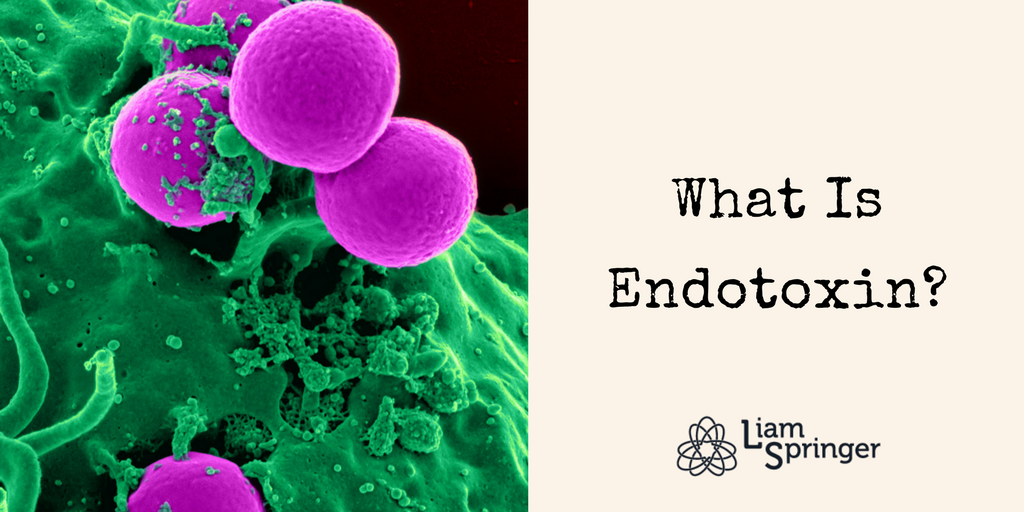
You may have heard the term “endotoxin” before. If so, you probably know it’s bad (its root word is “toxin” after all). But you may not fully understand what it is or how it affects your health. In this post, I explain the definition of endotoxin, the effects of endotoxin, and how your diet affects your level of exposure to this harmful chemical.
What is Endotoxin and Why Is It Important?
Endotoxin is a type of molecule called a lipopolysaccharide (LPS). It is formed by gram-negative bacteria, which is found in the intestines of all humans. Endotoxin is important because it has highly toxic effects on all human cells. The primary method by which it impairs your cells is by inhibiting the ability of the cell to oxidize fuel substrates. In short, it keeps your cells from being able to produce energy efficiently. This impairment leads to all sorts of undesirable health effects.
What is endotoxin? It’s a type of molecule called a lipopolysaccharide that has highly toxic effects on all human cells.
What Specific Effects Does Endotoxin Have on Your Health?
Endotoxin is a strong promoter of inflammation and is therefore highly toxic and degenerative. It is immediately detrimental to the liver and blood vessels.1-2 It is also being studied as a possible influence on heart disease; it has been correlated with atherosclerosis and chronic heart failure.3-4 In addition, the fact that LDL (or “bad cholesterol”) has been seen to be manufactured as a method of absorbing and transporting endotoxin in order to protect against its harmful effects shows that endotoxin could play a role in causing high cholesterol.5
Endotoxin exposure reduces your stores of glycogen and interrupts your ability to:
- Regulate blood sugar
- Remove toxins
- Balance hormones
- Convert thyroid
In studies within the human population and experimental trials, all of the following have been correlated with exposure to endotoxin:
- Obesity6
- Diabetes6
- Arthritis7
- Chronic fatigue8
- Sclerosis9
- Alzheimer’s disease10
- Anxiety11
Chronic overexposure to endotoxin significantly lowers the body’s threshold for stressful challenge. It leads to impaired liver function, brain function, general metabolism, and cardiorespiratory function.
How Does Your Diet Affect Your Level of Exposure to Endotoxin?
When your intestine is functioning well and nourished by nutrient-rich blood, the level of infection is maintained in balance with your immune system’s ability to protect you from the harmful effects of endotoxin. However, when you consume foods that irritate your intestine, or when you are under stress which directs your blood away from the intestine, or when your metabolism is otherwise compromised, you are exposed to a larger amount of endotoxin—and your liver is burdened with the task of removing it. If your body is unable to remove the chemical before it enters your bloodstream, you will begin to experience global degenerative effects throughout your entire body. In particular, the lungs, brain, and cardiovascular system are highly susceptible to the toxic effects of endotoxin.
So, How Can You Regain a Healthy Balance Within Your Intestine?
Eat foods that aid in proper nutrition and are easily digested (e.g., these three top superfoods), as well as foods that aid in reducing the presence of bacteria and other gastrointestinal toxins (including endotoxin).
In review, endotoxin exposure is one of the essential challenges your body faces from birth. Given its prevalence and toxic nature, it is no surprise that endotoxin is implicated as a potential contributor to nearly all developmental diseases.
For more answers to complex health and nutrition questions—like “What is endotoxin?,” “Is kale a superfood?,” and “Why is bad posture so bad?”—browse my blog or sign up for my monthly newsletter.
Want to try a new exercise method that’s great for pain management, strength and stability, and flexibility? Visit BTMAStudios.com to register for ELDOA group classes.
References
- Harte AL, da Silva NF, Creely SJ, et al. Elevated endotoxin levels in non-alcoholic fatty liver disease. J Inflamm (Lond) 7 (2010): 15. http://www.ncbi.nlm.nih.gov/pmc/articles/PMC2873499/
- Stetson CA. Vascular effects of endotoxins. Bull N Y Acad Med 37, No. 7 (Jul 1961): 486-492. http://www.ncbi.nlm.nih.gov/pmc/articles/PMC1804688/
- Wiedermann CJ, Kiechl S, Dunzendorfer S, et al. Association of endotoxemia with carotid atherosclerosis and cardiovascular disease: prospective results from the Bruneck Study. J Am Coll Cardiol 34, No. 7 (Dec 1999): 1975-1981. http://www.ncbi.nlm.nih.gov/pubmed/10588212
- Charalambous BM, Stephens RCM, Feavers IM, Montgomery HE. Role of bacterial endotoxin in chronic heart failure: the gut of the matter. Shock 28, No. 1 (Jul 2007): 15-23. http://journals.lww.com/shockjournal/Fulltext/2007/07000/Role_of_Bacterial_Endotoxin_in_Chronic_Heart.3.aspx
- Eichbaum EB, Harris HW, Kane JP, Rapp JH. Chylomicrons can inhibit endotoxin activity in vitro. J Surg Res 51, No. 5 (Nov 1991): 413-416. http://www.ncbi.nlm.nih.gov/pubmed/1758174
- Cani PD, Bibiloni R, Knauf C, et al. Changes in gut microbiota control metabolic endotoxemia-induced inflammation in high-fat diet–induced obesity and diabetes in mice. Diabetes 57, No. 6 (Jun 2008): 1470-1481. http://diabetes.diabetesjournals.org/content/57/6/1470.full
- Noyori K, Okamoto R, Takagi T, et al. Experimental induction of arthritis in rats immunized with Escherichia coli 0:14 lipopolysaccharide. J Rheumatol 21, No. 3 (Mar 1994): 484-488. http://www.ncbi.nlm.nih.gov/pubmed/8006893
- Maes M, Coucke F, Leunis JC. Normalization of the increased translocation of endotoxin from gram negative enterobacteria (leaky gut) is accompanied by a remission of chronic fatigue syndrome. Neuro Endocrinol Lett 28, No. 6 (Dec 2007): 739-744. http://www.ncbi.nlm.nih.gov/pubmed/18063928
- Zhang R, Miller RG, Gascon R, et al. Circulating endotoxin and systemic immune activation in sporadic Amyotrophic Lateral Sclerosis (sALS). J Neuroimmunol 206, No. 1-2 (Jan 2009): 121-124. http://www.ncbi.nlm.nih.gov/pmc/articles/PMC2995297/
- Kahna MS, Kranjaca D, Alonzo CA, et al. Prolonged elevation in hippocampal Aβ and cognitive deficits following repeated endotoxin exposure in the mouse. Behavioural Brain Research 229, No. 1 (Apr 2012): 176-184. http://www.sciencedirect.com/science/article/pii/S0166432812000289
- Toma T. Cytokine secretion linked to emotional and cognitive disturbances. The Scientist (May 2001). http://www.the-scientist.com/?articles.view/articleNo/20535/title/Cytokine-secretion-linked-to-emotional-and-cognitive-disturbances/






